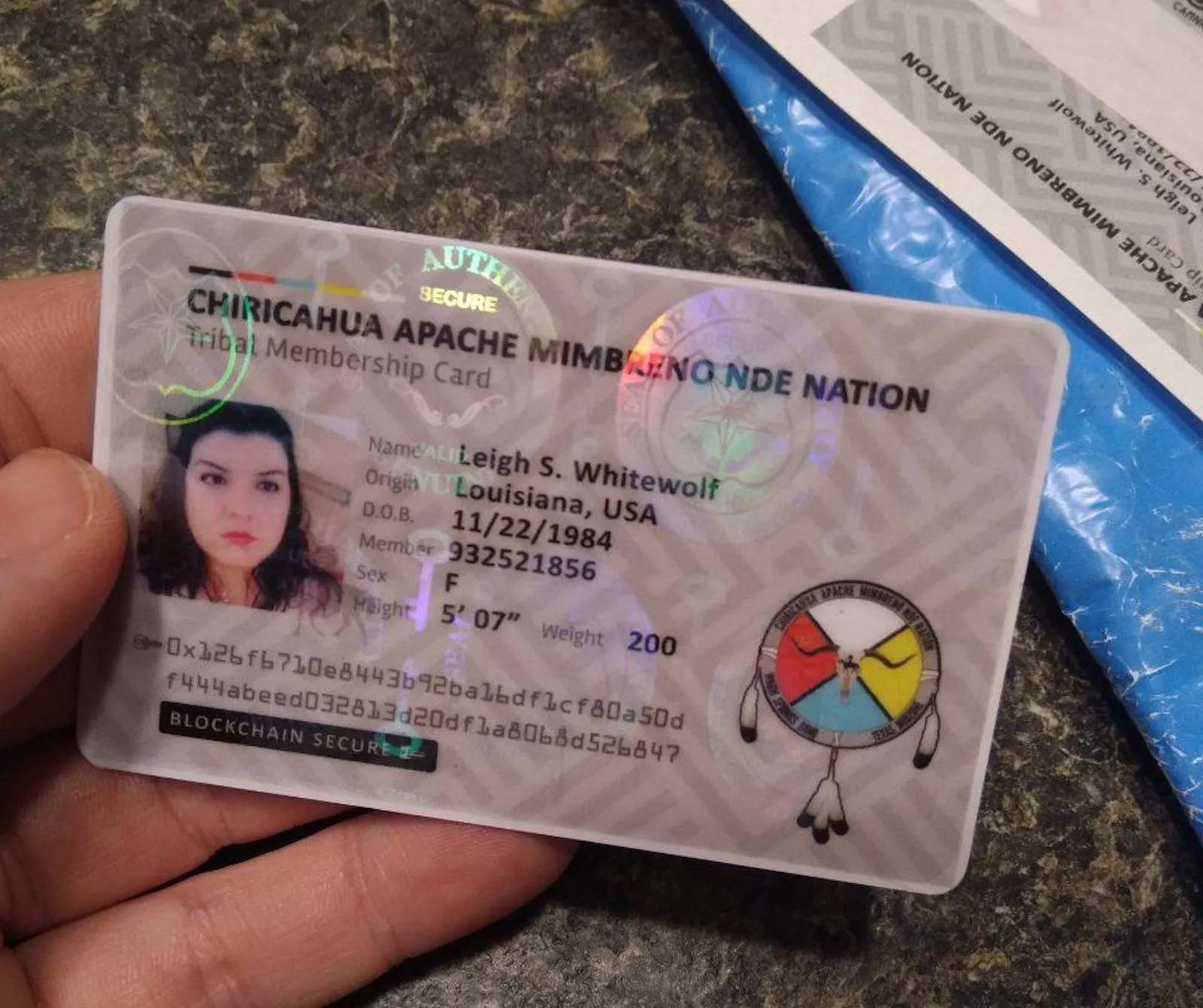Chief Runningwolf’s real name is Carlos Mendoza, but he’ll sue you if you call him that. "I don’t accept defamation of character. George III didn't, the Queen of England doesn't." When you’re rebuilding your ancestral tribe from the ground up, using a newfangled technology that nobody really understands, you need to get respect.
Runningwolf has clearly taken a page from the playbook of Jeffrey Berns, the billionaire building a Utopian techno-paradise in Nevada. Like Berns, Runningwolf wants to make use of blockchain—the anarcho-libertarian tech that underlies bitcoin—to codify the writ of a new society. Yet his are arguably grander plans: he wants his tribe, the Chiricahua Apache Mimbreno Nde nation—a West Texas tribe dormant (“running like DOS in the background") since it refused to surrender to the U.S. federal government 200 years ago—to become the first multinational nation, a digital community transcending laws and borders.
He says he has 750 members already, several vast tracts of land, a partnership with a UNESCO-award-winning crypto company, and, most importantly, that the spirits told him to do this. So, is it more spurious marketing from cryptoland, or is Mr. Runningwolf for real? Will he really build the first Apache nation to abide solely by the law of algorithm?
The Old Gods and the New
Runningwolf makes a confusing first impression. He fills emails with ellipses, as if he’s deeply suspicious, half-asleep, or both. He sends odd links unbidden. One email contains a draft for a recent tribal newsletter. A front-page scoop boasts that martial artist and B-movie extraordinaire David Carradine has just joined the tribe. (Despite the fact Carradine died in 2009 of apparent auto-erotic asphyxiation.)
Some we speak to question Runningwolf’s authenticity. Pablo Martinez, chairman of the Chihene Apache Mimbrenos tribe, says Runningwolf once visited his house clad in stereotypical Apache dress, which Martinez found offensive. (Runningwolf claims he was being ironic.) “He wants to impress non-native people. But real Apaches can see right through him,”Martinez says, adding, “He can’t even spell ‘Mimbreno’ correctly.” (Again, Runningwolf disputes this.)
Nevertheless, we get in touch with Runningwolf and he recounts, via phone, the mystical and not entirely trustworthy journey that brought him to blockchain.
Between 2003 and 2005, following 27 years as a contractor in LA, Runningwolf suffered four heart attacks, which brought on a “spiritual awakening.” It was the last one, in 2005, which really shook him. So did the doctors. “They hit me with the paddles. They put 50,000 volts through me,” he thunders through the phone. “They gotta hit you within 15 minutes otherwise you’re dead...well, you actually are dead, that’s why they’re hitting you with the paddles.”
“The electrical shock reboots you,” he continues. “When you’re being rebooted, you’re being turned on and you’re being enlightened.” Next were the visions, which his spiritual adviser explained were a call from the spirits. They wanted him to assert himself as Chief, he adds.
Taking advantage of a program with the U.S. Small Business administration, Runningwolf set about acquiring old tribal lands in West Texas, New Mexico, Arizona, Nevada, and California, left to him, he says, by right. (We have yet to corroborate this.) At the same time, he didn’t—and doesn’t—much care for antiquated traditions. “What am I supposed to do, carry around a bow and arrow?” he asks. Moreover, he wasn’t prepared to submit his tribe to federal supervision, another well-steeped tradition that is, he says, soaked in Native American blood.
So he enlisted Charles “Chas” Holloway, a prominent crypto-libertarian and the self-described “whitest guy ever,” to write a constitution that would establish tribal sovereignty—not via political channels, but through code. He chose Holloway in particular for his conviction (spelled out in a book Runningwolf obtained via Holloway’s brother) that freedom, by way of something he calls “Open Source Government,” can be hardwired into society using blockchain technology.

Governing The Ungoverned
How does Open Source Government work? To bring about Holloway’s perfect freedom, a given society must upload its entire record—financial transactions, birth certificates, legal rulings, constitutional amendments —onto a decentralized, interdependent network of computers that cannot be hijacked by any single authority—not individuals, special-interest groups, or governments. Supposedly, citizens can then act freely, without coercion from on high.
Runningwolf partnered with Bitnation, a Switzerland-based crypto startup, to build such a network. “Pangaea,” Bitnation’s flagship Ethereum-powered app, holds legal records and supports decentralized “governance structures” that allow users to collaboratively administrate micro-societies of their choosing (these can range from democracies to “hopefully benevolent” dictatorships, says Eddy Azar, a Bitnation spokesman). It’s like Facebook, but with laws, and without Zuckerberg.
Pangaea, which has already been deployed by the Estonian government and garlanded by UNESCO, is built to run governments as if they were computer software, says Azar. “There are thousands of operating systems built on Linux, but they’re all based on Linux,” he says. “We’re trying to do the same thing with governments.”
Through this app, Runningwolf’s Apaches would have their own private, online jurisdiction that extends across both digital and physical domains. Cryptocurrencies could be used to trade duty-free goods and services with fellow tribesmen (and, optimistically, “China,” says Runningwolf).
Tribal provisions, both online and off—including an online casino and a planned array of trailer parks for nomads, distributed through the lands he purchased —will be accessible via an ID card with a specialised QR code that carries immutably preserved genetic proof of lineage (this is stored off-chain, in the tribe’s own data troves).
To join requires a “tax deductible” $350 processing fee, and a copy of a driving license. In addition, DNA proof of Native American ancestry must be submitted for the full tribal package. The processing fee, according to Runningwolf, will be redistributed among members as a to-be-designed cryptocurrency, under the Apache term “Zhaali”—money.
Jonathan Mills, Bitnation’s media director, hopes the federal government will one day recognise bearers of the ID cards as eligible for federal provisions. Applying for these provisions through the Bureau of Indian Affairs, he says, can be a cumbersome and expensive legal process. (Runningwolf’s tribe, by choice, hasn’t applied for BIA approval.)
Bitnation already has several high-profile micro-nation clients, including Liberland, the sliver of unoccupied land between Croatia and Albania that was claimed by crypto-anarchists in 2015.

But there are questions about Runningwolf’s motives, echoing and embellishing upon the claims made by Martinez. Ray Alvarez, a native who initially expressed interest in Runningwolf's wild scheme, claims that the chieftain bilked his sister of a $2,000 "administrative fee," which he promised to return—but didn’t. "People have given him money, and he’s been stealing," said Alvarez.
When he put this to Runningwolf, he said, he was told that “asking a question is defamation of character." "It's unbecoming of a chief," he said.
Runningwolf denied any wrongdoing, threatening to “bankrupt” us with a lawsuit.
Similarly, there is scant evidence that Runningwolf owns the land he says he does. His website features only a stock photo of a desert, and a casino. Queries about his supposed deal with the Small Business Administration, meanwhile, yielded nothing. Several other government agencies also denied knowledge of the scheme. Runningwolf insisted it was true, forwarding a complex legal statute as proof.
Libertarian Side Effects
Similar doubts can be raised about Runningwolf's business model, and the viability of "Open Source Government." Since there would be no centralized authority to enforce tribal law in Runningwolf’s domain, punishment and damages would be meted out automatically through smart contracts, binding agreements between parties that are preserved in code. These are digitally signed by third party “arbitrators” who stake digital cash on mediating disputes fairly.
But smart contracts have obvious limits; they can only impose justice digitally, such as through automatically docking criminals’ credit ratings and blocking tribal provisions.
Chas Holloway says that for the more heinous crimes members would be automatically “ostracized” by a sort of freelance tribal police. He’s unable to explain, however, where their authority would derive. Moreover, where would the criminals be sent?
“To the moon!” Holloway laughs. A joke, but sort of serious; if Open Source Government is implemented across all governments and nations, ostracization would effectively entail banishment from Earth. Well, nearly. “There could be a government that specifically caters to murderers,” he deliberates.
Mildly dystopian implications notwithstanding, Runningwolf’s constitution was signed and ratified by a council of tribal elders on May 5, 2018. The signing took place not amid the Great Plains, but at Libertopia, a San Diego-based Libertarian convention where California tech upstarts mingled with Native American elders.
After the ceremony, in which Runningwolf was anointed with incense and presented with a ceremonial eagle feather, he was — at least by Libertopia’s standards — Chief of his blockchain tribe. Or as he puts it, “King and Queen.”
So what’s next for the Chiricahua Apache Mimbreno Nde Nation? Will Runningwolf attempt to lead his people to a full-blown secession from the United States?

He’s not sure. “Native Americans have always had one foot on the white path, and one foot on the red path,” he muses. “We’ve historically walked both paths. I’m just perfecting the red path.”
The exact contours of that path have yet to emerge. Indeed, Bitnation readily admits that it’s early days; currently Runningwolf’s tribe has around 700 members, largely sourced “through Facebook.” But Bitnation is working with several other tribes on similar projects, and it almost goes without saying, a token sale is in the works. Let's hope the SEC doesn't shut him down.
Read next: Ex-cop plans for apocalypse with bitcoin





